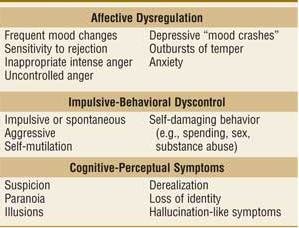BPD
Borderline Personality Disorder
Borderline personality disorder (BPD) is an emotional disorder that causes emotional instability, leading to stress and other problems.
People with borderline personality have a distorted and flawed image of the self with feelings of worthlessness. This leads to anger, impulsivity and frequent mood swings which may push others away, even though the person desires loving relationships.
Causes:
- Genetics. Borderline personality disorder may be inherited.
- Environmental. People with Borderline personality disorder have a history of childhood abuse, neglect and separation from caregivers or loved ones.
- Brain abnormalities. Changes in certain areas of the brain involved in emotion regulation, impulsiveness and aggression, and in certain brain chemicals that help regulate mood, such as serotonin, may cause Borderline Personality Disorder.
In addition, other mental disorders, may be precipitated or co-exist, including:
- Depression
- Paranoia
- Substance abuse
- Anxiety disorders
- Eating disorders
- Bipolar disorder
At times, hospitalization may be for more intensive treatment and to prevent self-injury.
Treatment:
Once thought to be untreatable, today, with advances in knowledge of brain functioning and chemistry, there is effective treatment available for Borderline personality disorder. Treatment may include medications, psychotherapy, or hospitalization.
Medications
Medications can help stabilize emotions, reduce impulsiveness, control anger, curb anxiety, lift depression and, in general help the affected individual to attain a stable state. It also opens up the person’s mind to psychotherapy.
Psychotherapy
Brief Intensive Gestalt (BIG) Therapy teaches the person to regulate emotions, tolerate distress and improve relationships by understanding the problems that have develop in that relationship. .
Hospitalization
At times, hospitalization may be required for more intensive treatment and to prevent self-injury.

Symptoms:
Borderline personality disorder affects:
- how you feel about yourself,
- how you relate to others and
- how you behave.
Symptoms include:
- an insecure sense of self: the self-image or sense of self often rapidly changes with the person viewing self as evil or bad, and sometimes may feel as they don’t exist at all. An unstable self-image often leads to frequent changes in jobs, friendships, goals and values.
- relationships usually in turmoil,
- Frequent love-hate relationship with others. The person may idealize someone one moment and then abruptly and dramatically shift to fury and hate over perceived slights or even minor misunderstandings.
- Impulsive and risky behavior, such as risky driving, unsafe sex, gambling sprees or illegal drug use
- Strong emotions that wax and wane frequently
- Intense but short episodes of anxiety or depression
- Inappropriate anger, sometimes escalating into physical confrontations
- Difficulty controlling emotions or impulses
- Suicidal behavior
- Fear of being alone
Many areas of the person’s life including intimate relationships, jobs, school, social activities and self-image can all be negatively affected. Relationships may be abusive, with the person being either the abuser or the abused. Repeated job losses and broken marriages are common. The emotional imbalance with impulsiveness may lead to self-injury, such as cutting or burning, and attempts at suicide. Risky, impulsive behavior may render the person vulnerable to risky sex, unplanned pregnancies, sexually transmitted diseases, motor vehicle accidents and physical fights.
